http://www.dw.de/ukraines-new-president-poroshenko-leads-old-team/a-17687907
Ukraine's new President Poroshenko leads old team
The newly elected president of Ukraine, Petro Poroshenko, has been sworn into office. During his campaign he promised "a new life" for the country. His team, however, consists largely of Yushchenko-era officials.
At the age of 48, Petro Poroshenko is the youngest of the five presidents who have held office in Ukraine since 1991. He is the first head of state in born into a generation of Ukrainians who grew up in the Soviet Union but made their careers career in an independent Ukraine. Unlike his predecessors, he speaks fluent English; he is also significantly richer, with an estimated wealth of more than a billion dollars.
Poroshenko will take office on Saturday (07.06.2014), two weeks after his victory in the presidential election.
The businessman owes his political rise to the popular movement that fought against corruption and pushed for Ukraine to strengthen its relations with the West. Last winter hundreds of thousands of Ukrainians protested on Kyiv's Maidan Square, demanding new faces in politics. Poroshenko was among the speakers on the stage, and he was listening carefully to the crowd's demands.
During his election campaign he promised Ukrainians "a new life" of prosperity - free of corruption. Apart from his promise to take back the Crimean peninsula from the Russians who annexed it, his election platform contained
Proximity to the leadership
The owner of several successful candy factories, Poroshenko's political career began in 1998 when he entered the Ukrainian parliament as a representative of the United Social Democratic Party of Ukraine. Critics called the party a "club of oligarchs" because its leaders were rich businessmen. Poroshenko was also a founder member of the Party of Regions that was swept away by the Maidan movement.
Like other oligarchs in Ukraine, Poroshenko has always aimed to stay close to the country's leadership. He served the government in a number of positions, including as head of the Security Council and minister of foreign affairs under the pro-Western president Viktor Yushchenko, but never stayed in one office for very long. He also worked with Yushchenko's successor, the pro-Russian head of state Viktor Yanukovych, and for several months he was his minister of trade and economic development.
While Maidan protesters called for a political changing of the guard politics, Poroshenko's presidency seems to herald the return of Yushchenko's team - starting with the new president himself.
Poroshenko was more supportive of Yushchenko than nearly any other prominent business leader, before and especially during the 2004 Orange Revolution. The two are also close friends, and Yushchenko is godfather to Poroshenko's twin daughters.
Yushchenko's legacy
However, as Yushchenko is now very unpopular, Poroshenko avoided drawing attention to his friendship with the former president during the campaign. But a close look at his team quickly shows that Poroshenko has surrounded himself with officials from the Yushchenko era.
For example, Poroshenko's election campaign was planned by Ihor Hryniv. The 53-year-old member of parliament and former director of the Kyiv Institute for Strategic Studies was once Yushchenko's adviser. He later represented his party "Nasha Ukraina" (Our Ukraine) in parliament.
The 43-year-old foreign policy expert and diplomat Valeri Chaly was also part of Yushchenko's team. During Poroshenko's election campaign Chaly was in charge of foreign policy issues. The 60-year-old Roman Svarych is also back in politics: Yushchenko's former justice minister now consults with Poroshenko on legal issues.
Elsewhere in the country the picture is the same. Viktor Baloha, for example, was the head of Yushchenko's secretariat during his presidency. He headed Poroshenko's election campaign in the western Ukrainian province of Transcarpathia.
No parliamentary party
As president, Poroshenko will have less power than his ousted predecessor. The Ukrainian parliament passed an amendment to this effect in February. The true center of power is now the parliament and the cabinet it elects. Poroshenko has already announced that he will work with the current interim prime minister, Arseniy Yatsenyuk of the "Batkivshchina" (Fatherland) party. Fatherland's chairman is the former Prime Minister Yulia Tymoshenko.
Poroshenko will also be relying on the recently elected mayor of Kyiv, the boxing champion Vitali Klitschko and his UDAR (Democratic Alliance for Reform) party. The two had already formed an alliance before the election. Klitschko has a strong parliamentary party and while Poroshenko founded a party of his own party, "Solidarnist" (Solidarity) in 2001, it more or less exists only on paper.
But Solidarity has seen recent growth thanks to Poroshenko's newfound popularity. Opinion polls show it leads the field with around 17 percent. Poroshenko has said he wants parliamentary elections to be held this year, and hopes that his party will emerge as the winner of the ballot.
Yuri Stetz and Yuri Lutsenko should be able to help him with that. Stetz, 38, headed Poroshenko's television channel, Channel 5, for more than 10 years. In the summer of 2013 Stetz, a member of parliament, was elected chairman of the Solidarity Party. Lutsenko, 49, was Yushchenko's minister of the interior, was imprisoned under Yanukovych, and campaigned on behalf of Poroshenko. Both are experienced politicians - not exactly the new faces the was calling for just a few months ago.
Zero Hedge.....
The Shadowy Commander Of The East Ukraine Insurgency Speaks
Submitted by Tyler Durden on 06/08/2014 11:05 -0400

Not much is known about Igor Strelkov, the man AP dubbed "the face of the insurgency in eastern Ukraine", and the fact that he keeps an ultra low profile certainly doesn't help his public image, if certainly boosting his shadowy, mystical status. However, yesterday in the aftermath of the swearing in of Ukraine's new president Poroshenko, Strelkov gave an extensive interview in which he laid out not only the "separatists" take on recent events in Ukraine but how they view the armed resistance strategically, and what, if any, the endgame is.
In any event, the following interview will certainly not be available on any western media outlets so for those who believe in hearing both sides of the story to development an informed opinion, read on.

Most Recent Interview by Strelkov, via @Gbazov
I believe that the situation will change for the worse, because now this so-called “legitimate” President immediately will turn to NATO countries, to Western countries, for help, asking, first and foremost, for military help.
We can then expect to be confronted with new NATO tanks, helicopters, aircraft, advisors, instructors, mercenaries. There will be greater numbers of shells, troops and victims. This is all that I expect from this so-called “inauguration.”
This morning [June 7, 2014] there was again artillery shelling of the Artem neighbourhood of Slavyansk. There our checkpoints are located along the perimeter, but the enemy regularly shells homes in civilian neighbourhoods. Specifically, the shells exploded here, here, near the Lenin Hospital, and here.
The enemy can “boast” that they finished off two of their broken-down “BMD” APCs. Well, more accurately, not “BMD” APCs, just APCs. These we had long ago taken apart into spare parts. So they hit these remaining shells; they finished them off, so to say.
With respect to infantry, we are facing a ratio of approximately 5-6 to 1. For one of my fighters there are 5-6 enemy soldiers. This is specifically with respect to the troops stationed directly near the city. Apart from that, there are also 50-60 pieces of heavy artillery, which is dedicated specifically to shelling the city. Also 1-2 Grad systems. A lot of tanks. These elements we cannot, unfortunately, engage directly, given the distance of 1.5-2 kilometres.
All in all, the ratio of forces remains very much not in our favour. So, although the enemy has moved a portion of its forces from our theatre and transferred it, as far as I can tell, to protect the border, nevertheless, we are having a difficult time holding our ground. As a result, first and foremost, we need active help in the form of armoured vehicles, long-range AA elements, and artillery. This is so because the greater part of the enemy artillery force conducts attacks from positions that we are unable to reach.
That is to say, they bombard us from long-range positions of absolute safety. All we can do is dig into the ground, build reinforced installations, but we are unable to counteract them in any way. Unfortunately, our mortars simply do not reach the positions of their heavy howitzers. No wonder, as we are facing such calibres as 240mm. The holes left by shells from these weapons in Semyonovka are easily identifiable.
It has become apparent, long ago, to anyone with even a superficial interest in military affairs that it is far easier to storm an intact city than a destroyed city. The Germans, in their time, got confirmation of this rule at Stalingrad. Yes, they are counting on being able to force the population out of here. And they claim that [once the population evacuates], they would be able to storm the city. In fact, this is simply a way to save face.
A significant part of the population, at least in Semyonovka and Cherevkovka, has already left. Semyonovka has barely anyone left. Same with Cherevkovka. And yet, they do not attempt to storm them. There is one simple reason why: they understand full well that they will suffer significant casualties. Their infantry does not exhibit sufficient fortitude, whether on attack or in defence. In effect, they are simply exacting vengeance against us for precision strikes against their artillery positions, their checkpoints, against their armoured vehicles. They are taking out their anger by carpet-shelling civilian neighbourhoods. In theory, it is possible that they believe they are firing at our positions; however, in 90% of cases they hit areas where we have no fighters present.
They conducted strikes against Nikolaevskaia Power Plant specifically with the intent of taking it out of commission, so at to cut off electrical supplies not only to our city, but to a whole number of cities in the north of Donbass region. In fact, this was a direct attack intended to destroy the infrastructure that feeds urban and industrial regions. The same can be said about the continuing bombardment of industrial locations. In sum, we are witnessing purposeful destruction of the industrial complex. You can draw an analogy to an old joke about a Ukrainian who says “Even if I can’t eat it, at least I’ll bite it.” In other words, if I can’t have you, no one can. About right.
I am predicting that not only the Slavyansk region, which, at this time, acts as a shield for the Lugansk and Donetsk oblasts/provinces, but also the entire territory of Lugansk and Donetsk regions will turn into a battlefield. It is obvious that no one will stop this military operation; no one is intending to terminate it. More than that, military elements are being used that are entirely excessive in fighting against small guerilla units. In fact, these elements are more-or-less useless. In a manner of saying, they are using cannons to shoot down birds. All of this will continue further, it will be transferred to Donetsk, to Gorlovka, to Makeevka, to Lugansk, to all the other cities and parts of the region. At least that’s how the Ukrainian army is acting. These are the conclusion that can be drawn from what the Ukrainian army is doing. This will turn into a humanitarian catastrophe not just at the scale of a city, but on the regional, possibly the world scale. I say this because there are over six (6) million inhabitants [in the region] that will become the targets of this very dumb, very unprofessional, very careless military machine. While guerillas (and we are, in fact, guerillas), i.e. militia, are able to defend cities, are able to repel infantry and even tank attacks by the enemy, we are, unfortunately, incapable of defending the region from airstrikes and artillery shelling. Equally, we are unable to destroy [artillery and aviation] because the ratio of the opposing forces remains disturbingly [not in our favour]. Regardless of how many volunteers we are able to field (and, first of all, we are unable to arm all of them, to this date we lack everything – rifles, ammo, anti-aircraft elements, and, most important, we lack anti-tank defence systems, including anti-tank artillery), and even if we receive all the necessary equipment and are able to match [Ukrainian] regular forces in combat, this would nevertheless lead to a complete humanitarian catastrophe in the region. Unfortunately, without peacekeeping forces (and I obviously mean Russian peacekeepers, as no other peacekeeping force would be accepted by us here, nor considered a “peacekeeping force”), the region will descend into bloody chaos, lawlessness. Everything that was built over decades would be lost, destroyed.
The Lugansk Republic also finds itself in a very difficult military situation, they must think of defending their own territory, their own cities and population. The one thing I can note is that we are coordinating our activities with the garrison in Lesichansk. This garrison made a request to be included in our command structure. Together with this garrison we are defending this part of the front.
Q: Poroshenko promised Putin that, in the nearest future, the war will be either brought to an end or suspended, in some manner. In your opinion, what did he mean when he said this?
A: I believe that what he meant is that the Ukrainian army will steamroll over the entire Donbass region, will eliminate all those who rose up against the illegitimate Kiev government, all those who rebelled against the discrimination directed against the Russian people, and that, in this manner, he would bring the war to an end. I think this is what he had in mind. An oligarch who sponsored the so-called “Maidan,” who made the most warlike claims and adopted extreme positions while still a Presidential candidate, who is a puppet controlled directly by the United States of America, this oligarch cannot change who he is in one day or one night. Of course, what he means is that he plans to “impose order” with an iron fist, the fist of his punitive forces. Put it bluntly, we saw how they “impose order” from the example of what happened in Krasniy Liman. That is why we will, of course, resist to the last man. We will resist successfully, I am emphasizing this again. The real problem is not that we will be unable to defend ourselves or to withstand attacks by the Ukrainian forces, the problem is that if this war continues indefinitely, the region will fall to a humanitarian catastrophe. As a result Russia will become the recipient of millions of disenfranchised, impoverished and angry refugees. Everything that was built, created over decades, if not centuries, will be destroyed.
We continue to prevail over them again and again, on all fronts. Nowhere have they been able to achieve a victory of any real significance. They were able to overwhelm our garrison of one hundred in Krasniy Liman by throwing a force of three thousand (3,000) and coming against them from all sides. Even so … And where they have to square off against a more-or-less trained, numerous, at least somehow provisioned force, they always, regularly suffer defeat. They cannot advance even a step. Their tactic consists of filling the landscape with troops, tanks, APCs, and artillery, and defending themselves, in hopes that, without numerical and equipment parity, we would be unable to push them from their positions. In effect, their positions at Mount Karachun are an example of this approach. We are unable to kick them out of Karachun first and foremost because their force is at least three times the size of my garrison [in Slavyansk].
We are blessed with excellent morale and fighting spirit, our fighters are highly motivated, while they have a great deal of old, but still effective “metal” [Note: i.e. armoured vehicles] that fights against our militia.
Ukrainian mass media lies, lies without end. They lie so unapologetically that Goebbels would have envied their style. He is probably turning in his grave now. And, so, they are interested in ensuring that no one else is able to provide this information. And, because Western media, to a large degree, plays along with its Ukrainian colleagues, and provides only such information that benefits Ukraine, the Russian media becomes their natural enemy. As a result, they consider the Russian media their direct enemy in the field of informational warfare.
With respect to international law and norms, they never cared for them on bit. For example, here they use cluster bombs and similar [illegal] weapons. They shoot, and, as you correctly pointed out, remove entire township from the face of the Earth. They shell cities. They will continue in this manner with ever-increasing [brutality]. This is because they experience no material opposition [to what they do]. They have no other tactic. They are unable to take up their weapons and go on attack, go storm our positions face-to-face with us, despite their profound numerical advantage in troops. As soon as their infantry faces direct combat, it retreats. They retreat even if supported by tanks. They abandon their tanks and retreat. They understand that their infantry is not combat-worthy. Their only option is to shell us from afar, again and again and again, and hope to inflict the greatest possible destruction.
Itar Tass
Natural Gas Talks ....
BRUSSELS, June 09. /ITAR-TASS/. Representatives of Russia, Ukraine, and the European Commission (EC) will make yet another attempt here on Monday to reach agreement on repayment of Kiev's debt for gas and determine a price for its further deliveries. Neither is it ruled out that, on the sidelines of these consultations, the EC and Russia will discuss the situation concerning the South Stream gas pipeline, the construction of which was suspended by Sofia on Sunday under a strong pressure from Brussels and Washington.
This will be already a fifth round of tripartite talks on gas with the participation of Russian Minister of Energy Alexander Novak, Yuri Prodan,Verkhovna Rada-appointed Minister of Energy and the Coal Industry, and Guenther Oettinger, EU Commissioner for Energy.
Sabina Berger, Commissioner Oettinger's press secretary, told Itar-Tass that the meeting would be also attended by Gazprom CEO Alexei Miller, and Andrei Kobolev, Head of the Board of the Naftogaz Ukrainy, who "held bilateral consultations last week" with a view to "settling a number of unresolved issues".
It is also expected that talks may be also held on Monday between Russia and the EU on the situation regarding the South Stream construction. On Sunday, Prime Minister Plamen Oresharski of Bulgaria announced after a meeting with a US Senators' delegation that he ordered suspending the work to build the pipeline pending rectifying deficiencies observed by the CE.
Gazprom implements the South Stream project with a view to diversifying the deliveries of natural gas to Europe and reducing dependence on gas-transit countries. The South Stream Transport B.V. Company is an international joint-venture (JV) enterprise which was established for planning out, building and subsequently operating the pipeline which is to be laid in the Black Sea water area. Gazprom's share in the JV is 50%, and that of the Italian Eni Company is 20%; the French EDF, and the German Wintershall Holding GmbH) have 15% each.
The maritime section of the South Stream gas pipeline will run across the bed of the Black Sea from the Russkaya (Russian) pumping station on the Russian coast to Bulgaria's shores. Its overall length will be more than 900 km, and maximum depth over two km; the rated carrying capacity will be 63 billion cubic metres of gas.
First deliveries of gas via the pipeline are slated for the end of 2015.
EU-Ukraine-Russia gas talks due in Brussels on Monday - Russian energy ministry
June 08, 11:31 UTC+4
The source said the meeting’s agenda would include gas prices for Ukraine
The source said the meeting’s agenda would include gas prices for Ukraine

MOSCOW, June 08 /ITAR-TASS/. A tripartite meeting of representatives of the European Union, Ukraine and Russia is due in Brussels on Monday, an official representative of Russia’s ministry of energy said on Sunday.
The source said the meeting’s agenda would include gas prices for Ukraine, and by June 10 the Ukrainian side was expected to settle all the issues of the overdue payments.
The previous round of tripartite talks was held in Brussels on June 2. They were attended by Russian Energy Minister Alexander Novak, European Commissioner for Energy Guenther Oettinger, as well as Ukrainian parliament-appointed Minister of Energy and Coal Industry Yuri Prodan. The talks focused on Ukraine’s debt. The parties agreed not to suspend gas supplies till the next round of tripartite consultations.
On Tuesday, June 3, Gazprom and Naftogaz of Ukraine agreed to negotiate bilaterally, without further mediation by the EU. Ukraine insists on the recalculation of its debt for the gas supplied in 2013 on the basis of a discounted price of $268.5 per 1,000 cubic meters for January-March.
On April 30 Ukraine’s debt reached 3.5 billion dollars.
On April 1, Gazprom cancelled two discounts and raised the price for Ukraine to 485.5 dollars per 1,000 cubic meters.
Ukraine is a transit country for Russian gas exports to Europe that is why such situation can hamper gas supplies to European consumers. In order to avoid supply disruption in May the consultations within the Russia-Ukraine-European Commission format were started in May.
The throughput capacity of the Ukrainian gas transportation is 288 billion cubic metres system at the entrance and 178.5 billion cubic meters at the exit, including 142.5 billion cubic metres to European countries and 3.5 billion cubic meters to Moldova. Ukraine’s gas transportation system consists of 72 compressor stations, 110 production shops and 1,451 gas distribution stations. The overall length of gas pipelines operated by the company is 38,600 kilometres, including 22,200 kilometres of trunk pipelines and 16,400 kilometres of extensions.
South East Ukraine Status .....

SLAVYANSK, June 08, /ITAR-TASS/. Ukrainian troops have resumed massive artillery shelling of the Semyonovka village near Sloviansk, the Donetsk region, from heavy guns.
A representatives of the self-defence forces told Itar-Tass on Sunday that the fire, presumably from the Grad multiple rocket launchers, was coming from Raigorodok settlement.
On June 7, a shell hit the Betonmash plant in Sloviansk causing fire in a workshop that manufactures paints, varnishes and lacquers. The self-defence forces said that two shells had also hit the building of the local Institute of High Voltage and a car wash in the Artyom district.
Meanwhile, Sloviansk is having problems with drinking water.
“The damaged water pipe has not yet been repaired. Only those who have stored water in bottles or have their own wells have drinking water,” the self-defence forces said, adding that most neighborhoods in Sloviansk were without electricity. With the coming of dusk, the Ukrainian troops use illuminating flares.
http://news.yahoo.com/rejecting-poroshenko-east-ukraine-rebels-fight-120313232.html
Rejecting Poroshenko, east Ukraine rebels say fight will go on
By Thomas Grove and Alissa de Carbonnel
SLAVIANSK/LUHANSK Ukraine (Reuters) - Pro-Russian separatists poured scorn on peace overtures from Ukraine's new president Petro Poroshenko on Saturday as fighting rumbled on in the east of the country.
Taking the oath of office in Kiev, Poroshenko appealed to the rebels to lay down their arms, offering peaceful dialogue and immunity from prosecution to "those who don't have blood on their hands".
But rebel spokesmen in the self-styled Donetsk People's Republic, which has declared independence from Ukraine and wants to unite with neighboring Russia, told Reuters the fight would continue.
"What they really want is one-sided disarmament and for us to surrender. That will never happen," said a top separatist official, Fyodor Berezin. "As long as Ukrainian troops are on our soil, I can see that all Poroshenko wants is subjugation," he said by telephone from Donetsk.
Since Poroshenko's election on May 25, government forces have stepped up what they call an 'anti-terrorist' campaign against the Russian-speaking separatists in the east.
The rebels have fought back, turning parts of the east into a war zone. On Friday they shot down a Ukrainian army plane and killed a member of the interior ministry's special forces in the separatist stronghold of Slaviansk.
Fighting continued around Slaviansk on Saturday and smoke could be seen rising above the surrounding forests.
Ukrainian armored personnel carriers and military transport vehicles lined the road leading into the city, and soldiers behind concrete blocks and sand bags trained their machine guns on cars and buses driving out.
Inna, 38, was leaving by foot with her mother and grandmother, carrying bags with food, water and clothes.
"All you hear is shelling and bombing. Yesterday entire houses burnt down. We've been hiding in the cellar for three days and we finally decided to leave. There is no water or electricity," she said.
In his speech, Poroshenko said the government was prepared to talk to peaceful citizens - "clearly not with gunmen and other scoundrels" - and would offer a safe corridor for fighters who had crossed the border from Russia to go home.
But his appeal appeared to fall on deaf ears.
"We have reached the point of no return," said Andrei Sukhanov, commander of the separatist Kaskad (Cascade) militia, manning a road block in Slaviansk.
PROTEST IN LUHANSK
While the government tightens its grip around Slaviansk, now encircled by the army, it appears to be losing ground in its easternmost region of Luhansk, where border guards have fled several bases after coming under attack.
Some 200 people protested against the presidential inauguration in the center of the city, some laying flowers on the sun-baked sidewalk in memory of eight people killed on Monday.
Residents say they died in an air strike from a Ukrainian plane which blew a hole in the regional administration building. The Ukrainian military denied this, blaming a misfire by separatists.
Broken glass and plaster crunched under the feet of the demonstrators.
"Our government is doing America's bidding. Poroshenko, we appeal to you to stop this - do you really want bloodshed?" shouted a red-haired woman to applause.
Frightened by the air-raid warning sirens that ring out over the city at night, Dmitry Grib, 20, said he was leaving for Moscow.
"I came to take a quick look before leaving," Grib said. "I don't trust him (Poroshenko). I didn't elect him."
But Olga Polovinka, who works as a medic in a charity for the homeless, said she was going nowhere. "This is our land. Why should we leave?" the 75-year-old demanded.
Separatist leader Valery Bolotov, governor of the self-proclaimed "Luhansk People's Republic", was emphatic in his rejection of Poroshenko and Ukrainian rule.
"The Ukrainians have made their choice and they must live with it. As for our republic, we have no diplomatic relations with Ukraine," he told journalists, wearing combat fatigues in a conference room hung with crystal chandeliers.
"Today Ukraine got a new president and now the blood of our people and of Ukrainians will lie on his conscience."
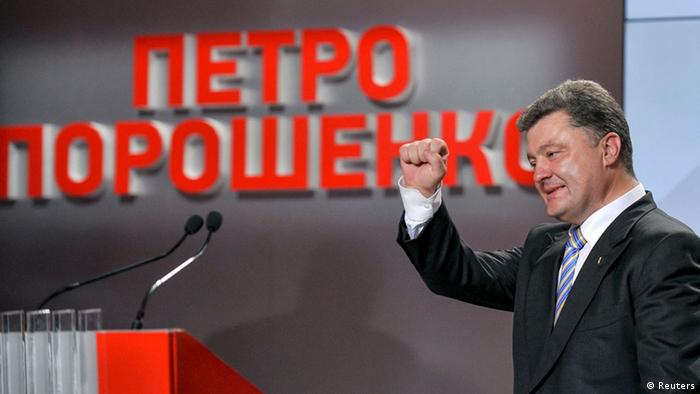
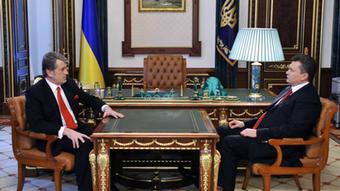
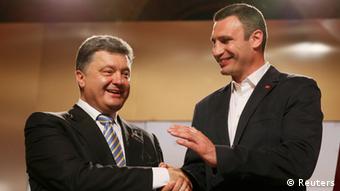



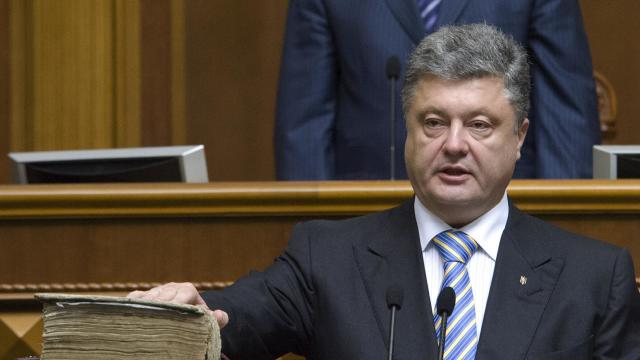



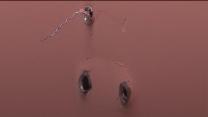
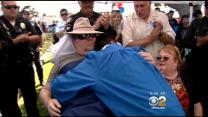
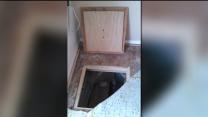

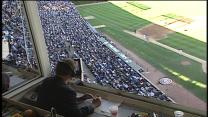
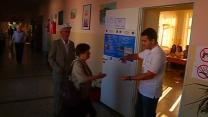
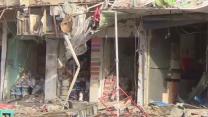
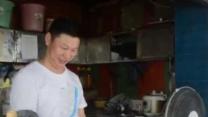
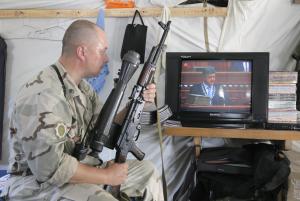
No comments:
Post a Comment